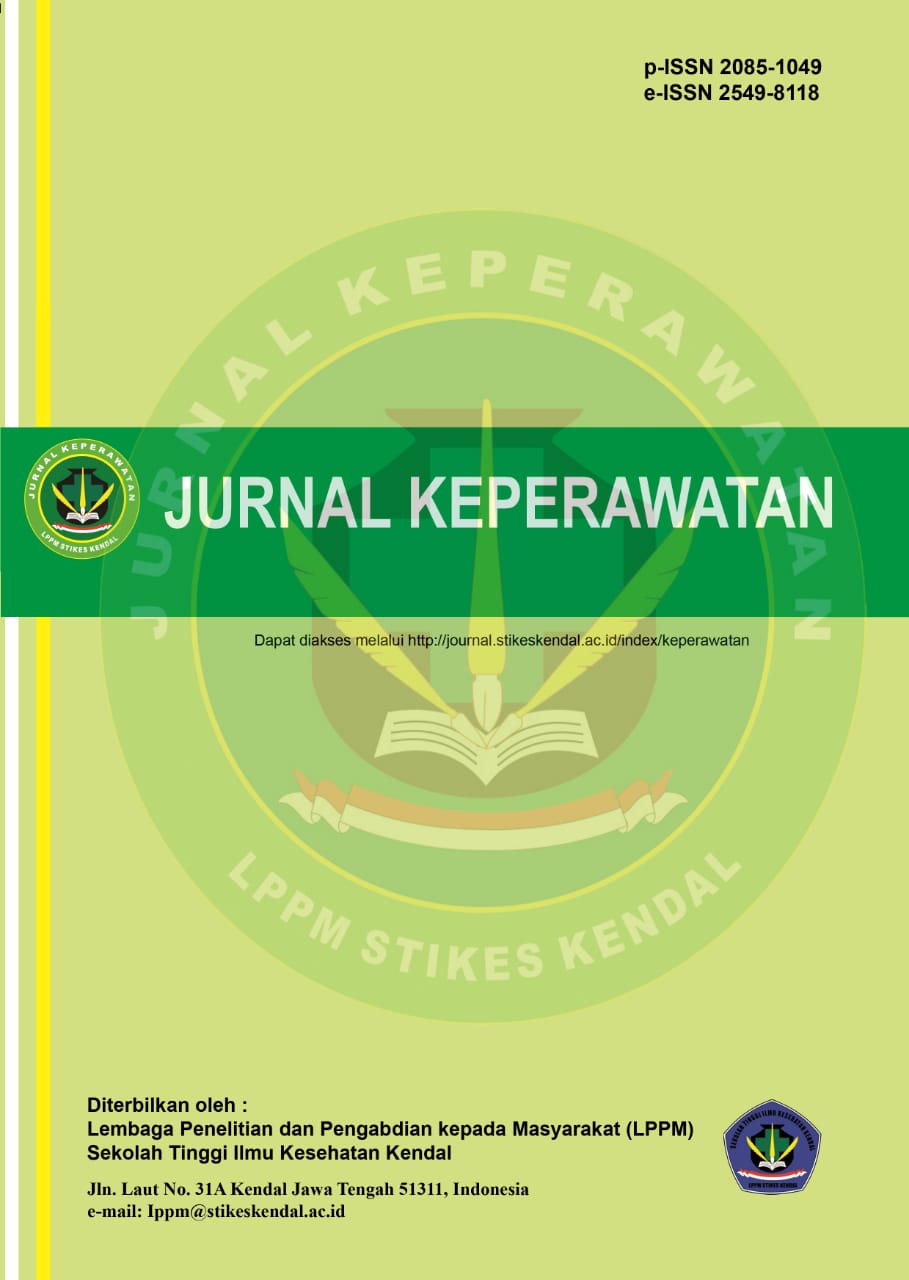Hubungan antara Kecemasan dengan Kepatuhan Minum Obat pada Pasien dengan Gagal Jantung
DOI:
https://doi.org/10.32583/keperawatan.v15i4.1900Keywords:
gagal jantung, kecemasan, kepatuhan minum obatAbstract
Gagal jantung merupakan suatu kondisi dimana jantung tidak mampu memompa cukup darah ke organ tubuh, dan jantung berhenti berfungsi dengan baik. Pada tahun 2018, prevalensi penyakit jantung di Indonesia sebesar 1,5% yang berarti sekitar 1.017.290 orang menderita gagal jantung. Salah satu gejala klinis penyakit jantung adalah stress dan kecemasan. Kecemasan dapat berdampak negative pada perilaku, misalnya kepatuhan berobat karena khawatir atau terlalu memikirkan penyakit yang dideritanya. Tujuan penelitian ini adalah untuk mengetahui hubungan antara kecemasan dengan kepatuhan minum obat pada pasien dengan gagal jantung. Metode yang digunakan adalah kuantitatif dengan pendekatan deskriptif korelasional. Populasi penelitian ini adalah pasien gagal jantung di poliklinik rawat jalan RS UNS. Teknik pengambilan sampel menggunakan purposive sample yang berjumlah 103 responden. Instrumen penelitian yang digunakan yaitu Kuesioner Karakteristik Demografi Responden, Cardiac Anxiety Questionere (CAQ) dan Medication Adharence Questionere (MMAS). Berdasarkan hasil penelitian, proporsi responden dengan kecemasan sedang sebanyak 14,6%, dan proporsi responden dengan kepatuhan pengobatan yang tinggi sebanyak 1,9%. Berdasarkan hasil analisis Chi-square diperoleh nilai p value sebesar 0,047 yang berarti H0 ditolak yang menunjukkan bahwa terdapat hubungan antara kecemasan dengan kepatuhan pengobatan pada pasien gagal jantung.
References
Aggelopoulpou, Z., Fotos, N. V., Chatziefstratiou, A. A., Giakoumidakis, K., Elefsiniotis, I., & Brokalaki, H. (2017). The level of anxiety, depression and quality of life among patients with heart failure in Greece. Applied Nursing Research, 34, 52–56. https://doi.org/10.1016/j.apnr.2017.01.003
Dempe, C., Jünger, J., Hoppe, S., Katzenberger, M. L., Möltner, A., Ladwig, K. H., Herzog, W., & Schultz, J. H. (2013). Association of anxious and depressive symptoms with medication nonadherence in patients with stable coronary artery disease. Journal of Psychosomatic Research, 74(2), 122–127. https://doi.org/10.1016/j.jpsychores.2012.12.003
Hajj, J., Mathelier, H., Drachman, B., & Laudanski, K. (2020). Sleep Quality, Fatigue, and Quality of Life in Individuals With Heart Failure. Journal for Nurse Practitioners, 16(6), 461–465. https://doi.org/10.1016/j.nurpra.2020.03.002
Hudiyawati, D., Ainunnisa, K., & Riskamala, G. (2021). Self-care and its related factors among patients with congestive heart failure in Surakarta, Indonesia. Journal of Medicinal and Chemical Sciences, 4(4), 364–373. https://doi.org/10.26655/JMCHEMSCI.2021.4.7
Hudiyawati, D., & Prakoso, A. M. (2020). Effectiveness of Cognitive Behavioral Therapy to Reduce Depression, Anxiety and Stress among Hospitalized Patients with Congestive Heart Failure in Central Java. Jurnal Ners, 14(3), 367–373. https://doi.org/10.20473/jn.v14i3.17215
Jong, M. J. De, Chung, M. L., Wu, J., Riegel, B., Rayens, M. K., & Moser, D. K. (2011). International Perspectives on Quality of Life in Cardiopulmonary Disorders Linkages between anxiety and outcomes in heart failure. Heart and Lung The Journal of Acute and Critical Care, 40(5), 393–404. https://doi.org/10.1016/j.hrtlng.2011.02.002
Lippi, G., & Sanchis-Gomar, F. (2020). Global epidemiology and future trends of heart failure. AME Medical Journal, 5(Ci), 2–7. https://doi.org/10.21037/amj.2020.03.03
Polikandrioti, M. (2015). Factors Associated with Depression and Anxiety of Hospitalized Patients with Heart Failure. Hellenic Journal of Cardiology, 56, 26–35.
Rosyida et al. (2015). Kepatuhan Pasien pada Penggunaan Obat Antidiabetes dengan Meode Pill-Count dan MMAS-8 di Puskesmas Kedurus Surabaya. Jurnal Farmasi Komunitas, 2(2), 36–41.
Saida, S., Haryati, H., & Rangki, L. (2020). Kualitas Hidup Penderita Gagal Jantung Kongestif Berdasarkan Derajat Kemampuan Fisik dan Durasi Penyakit. Faletehan Health Journal, 7(02), 70–76. https://doi.org/10.33746/fhj.v7i02.134
Tang, H. J., Sayers, S. L., Weissinger, G., & Riegel, B. (2014). The Role of Depression in Medication Adherence Among Heart Failure Patients. https://doi.org/10.1177/1054773813481801
Aggelopoulpou, Z., Fotos, N. V., Chatziefstratiou, A. A., Giakoumidakis, K., Elefsiniotis, I., & Brokalaki, H. (2017). The level of anxiety, depression and quality of life among patients with heart failure in Greece. Applied Nursing Research, 34, 52–56. https://doi.org/10.1016/j.apnr.2017.01.003
Dempe, C., Jünger, J., Hoppe, S., Katzenberger, M. L., Möltner, A., Ladwig, K. H., Herzog, W., & Schultz, J. H. (2013). Association of anxious and depressive symptoms with medication nonadherence in patients with stable coronary artery disease. Journal of Psychosomatic Research, 74(2), 122–127. https://doi.org/10.1016/j.jpsychores.2012.12.003
Hajj, J., Mathelier, H., Drachman, B., & Laudanski, K. (2020). Sleep Quality, Fatigue, and Quality of Life in Individuals With Heart Failure. Journal for Nurse Practitioners, 16(6), 461–465. https://doi.org/10.1016/j.nurpra.2020.03.002
Hudiyawati, D., Ainunnisa, K., & Riskamala, G. (2021). Self-care and its related factors among patients with congestive heart failure in Surakarta, Indonesia. Journal of Medicinal and Chemical Sciences, 4(4), 364–373. https://doi.org/10.26655/JMCHEMSCI.2021.4.7
Hudiyawati, D., & Prakoso, A. M. (2020). Effectiveness of Cognitive Behavioral Therapy to Reduce Depression, Anxiety and Stress among Hospitalized Patients with Congestive Heart Failure in Central Java. Jurnal Ners, 14(3), 367–373. https://doi.org/10.20473/jn.v14i3.17215
Jong, M. J. De, Chung, M. L., Wu, J., Riegel, B., Rayens, M. K., & Moser, D. K. (2011). International Perspectives on Quality of Life in Cardiopulmonary Disorders Linkages between anxiety and outcomes in heart failure. Heart and Lung The Journal of Acute and Critical Care, 40(5), 393–404. https://doi.org/10.1016/j.hrtlng.2011.02.002
Lippi, G., & Sanchis-Gomar, F. (2020). Global epidemiology and future trends of heart failure. AME Medical Journal, 5(Ci), 2–7. https://doi.org/10.21037/amj.2020.03.03
Polikandrioti, M. (2015). Factors Associated with Depression and Anxiety of Hospitalized Patients with Heart Failure. Hellenic Journal of Cardiology, 56, 26–35.
Rosyida et al. (2015). Kepatuhan Pasien pada Penggunaan Obat Antidiabetes dengan Meode Pill-Count dan MMAS-8 di Puskesmas Kedurus Surabaya. Jurnal Farmasi Komunitas, 2(2), 36–41.
Saida, S., Haryati, H., & Rangki, L. (2020). Kualitas Hidup Penderita Gagal Jantung Kongestif Berdasarkan Derajat Kemampuan Fisik dan Durasi Penyakit. Faletehan Health Journal, 7(02), 70–76. https://doi.org/10.33746/fhj.v7i02.134
Tang, H. J., Sayers, S. L., Weissinger, G., & Riegel, B. (2014). The Role of Depression in Medication Adherence Among Heart Failure Patients. https://doi.org/10.1177/1054773813481801
.
Downloads
Published
How to Cite
Issue
Section
License
Copyright (c) 2023 Jurnal Keperawatan

This work is licensed under a Creative Commons Attribution-NonCommercial-NoDerivatives 4.0 International License.



